Among display technologies, especially those that show up in mobile handsets, AMOLED is very high on end-uses preference lists. Samsung Mobile Display even sometimes finds itself barely able to meet demand. On the other hand, the company appears especially keen on preparing for the future. As such, it plans to improve the AMOLED technology as often as it can, in order to preserve or even increase its appeal. The next step will see Samsung adding a fair bit of sturdiness to its panels.
Samsung Mobile Display intends to change the way its AMOLED screens are manufactured, with the goal being of making them virtually unbreakable. The means by which it will achieve this involves plastic and polymide film. To be more specific, the AMOLED panels will be switched to plastic on the universal board. This feat will be achieved by placing the TFT (Thin Film Transistor) on the plastic panel and by using the aforementioned polymide film instead of the vinyl protection currently implemented. This will help avoid residue upon light emission.
It should probably be noted that unbreakable does not imply lack of flexibility in this case. In fact, the significant flexibility that plastic inherently provides will contribute to the AMOLED's indestructibility. Samsung even released a video demonstration, in which a small prototype was repeatedly struck by a hammer and mercilessly bent, even as it had no problems playing a video of what looked like a car race. The panel didn't get even the smallest scratch and easily regained its shape.
Unfortunately, as is often the case with promising projects, it will take a while for this new AMOLED display to be finalized. Samsung expects to complete a commercially-viable screen in about two years. When it does, and depending on how much more the popularity of such solutions grows by then, it may even lead to changes in the design of smartphones and whatever other mobile electronics they end up in.

 14 DAY TRIAL //
14 DAY TRIAL //